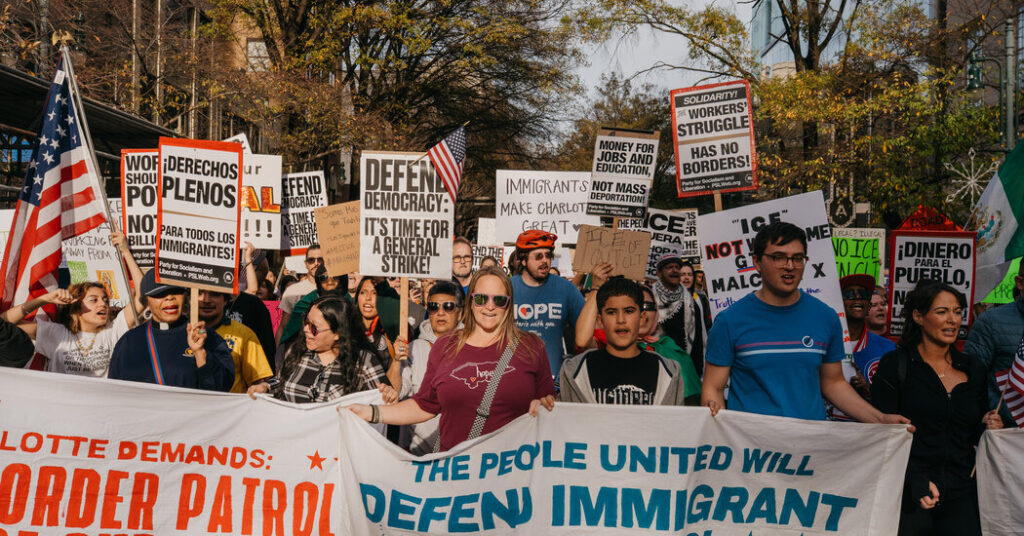The city of Charlotte was just maturing into a glossy, multiethnic metropolis when Dora Martinez moved here from Mexico nearly three decades ago.
She watched as the city’s banking industry, the country’s second-largest behind New York, created a boom for construction workers, many of them undocumented, and transformed Charlotte into a haven for immigrants, especially from Latin America.
Now she looked out at her sliver of East Charlotte, a walkable immigrant enclave, and saw it devoid of foot traffic. She had seen the masked men in paramilitary uniforms zooming past her house in black S.U.V.s and had decided not to venture out for groceries or for shifts at a nearby laundromat. But she allowed herself a few moments of fresh air at dusk to hide from agents of “la migra” — slang for the Border Patrol — searching for undocumented people like her.
Resting on Sunday evening on a plastic chair, Ms. Martinez wondered when the agents would leave the city that now felt more like home than Mexico.
“Why here?” she asked. “Why us?”
As the Trump administration’s crackdown on illegal immigration spreads, North Carolina’s largest city has emerged as an unexpected target far from any border, shaking a region that has quietly become one of the largest hubs in the country for international migration. Agents have since spread into Raleigh and Durham, also liberal strongholds, but most of the focus has remained on Charlotte.
There are about 190,000 foreign-born residents living in Mecklenburg County, home to Charlotte, and the Hispanic population in the region has significantly increased since 2020. Mango and coconut vendors typically fill streets across from pupusa restaurants and tortillerias, where businesses carry Spanish-language newspapers.
But the Border Patrol operation — which federal officials say has led to more than 200 arrests since Saturday — has also laid bare the tensions that have been simmering for years in Charlotte over immigration and crime, even as some argue that the city’s growth would not have been achievable without migrants.
Many of Charlotte’s crystalline skyscrapers, as well as the subdivisions around them, were built by Hispanic construction crews. In the early 2000s, though, many Charlotteans began expressing a need to stem the tide of migration, especially after a resident was killed by an undocumented immigrant who was driving while drunk. Since then, mixed feelings over migration have persisted.
“People move to Charlotte for this suburban dream, and they get confronted with a city that’s very much growing into adulthood and has a reality of a burgeoning immigrant population,” said Federico Rios, a former city official responsible for immigrant integration. “Some of the folks, they left home to get away from the perceived negatives of those things.”
The operation comes at a particularly difficult moment for Charlotte. In August, a Ukrainian woman was killed on a light-rail train, igniting a firestorm on the right over the perceived failings of cities led by Democrats. City data shows that homicides in Charlotte are down 24 percent compared with this time last year. Still, some Republicans tied their concerns about crime to broader complaints about illegal immigration.
Data shows immigrants are less likely to commit crimes than native-born Americans, but conservatives have argued that any crime committed by someone in the country illegally could have been prevented by strict immigration enforcement.
Then in mid-October, Gregory Bovino, a North Carolina native who has led the Border Patrol operations in Los Angeles and Chicago, replied to an account on X who recommended that he head to Charlotte next.
“We’ll put Charlotte on the list!!!” Mr. Bovino replied.
Now, his operation — named Charlotte’s Web in a reference to the children’s book — has drawn criticism for its aggressive tactics. Attendance has dropped at public schools. Adults have skipped work, prompting small businesses to close. And many have accused agents of profiling Latinos.
Some residents have been fighting back, honking horns at the agents in parking lots, raising their middle fingers and shouting expletives at them. Two men were charged in separate incidents and accused of using their vehicles to assault, resist or impede federal agents conducting immigration enforcement operations in Charlotte.
In one instance, federal agents who were trying to detain a Latino man selling flowers near a wooded road were met with a wave of people who hounded the agents and criticized them for terrorizing someone who was simply trying to work. The man managed to escape into the woods.
Federal officials have not specified exactly how many of the people arrested in Charlotte have criminal histories. Mr. Bovino has posted about a handful of examples on X. Homeland Security said on Tuesday that among the more than 200 people taken into custody, 44 had criminal records.
Some have praised Mr. Bovino’s efforts, including Kyle Kirby, the chair of the Mecklenburg County Republican Party, who said that “of course having less people here that should not be here will likely cut down on violent crime.”
Lorena Castillo-Ritz, a Republican of Salvadoran descent who previously led the county’s Republican Party, said she was disappointed that fear-mongering about the Border Patrol in the news media had probably caused a lower turnout at Sunday Mass, which is usually filled with Latino worshipers.
“If they are picking up criminals, I’m good with that,” she said.
Neither Mr. Bovino nor Homeland Security have fully explained why the Trump administration chose Charlotte as its latest target. It is less liberal than Chicago or Los Angeles. Sanctuary cities are illegal in North Carolina. And the operation puts a purple state firmly at the center of one of the administration’s most visible immigration strategies.
But Republicans have frequently clashed with the sheriff of Mecklenburg County, Garry McFadden, who won his election in 2018 after he promised to terminate the county’s 287(g) agreement, which provides local law enforcement agencies with funding to engage in federal immigration enforcement activities.
During his election night victory party, Mr. McFadden sliced a cake with “287(g)” printed on the frosting. Ever since, he has drawn the ire of conservatives over policies related to the jailing of undocumented immigrants.
“We are a strong Democratic city run by a Democratic, Black sheriff, who they call the woke sheriff,” Mr. McFadden said in an interview, referring to Republicans. “They want to target us. We expect that. It’s not a surprise to us. None of this is.”
Many Black leaders in Charlotte say they see this as the Trump administration’s targeting of yet another Democratic city led by a Black mayor — in this case, Vi Lyles, who handily won re-election this month.
“It’s part of a playbook,” said State Representative Aisha Dew, who is Black and represents Mecklenburg County, adding: “I’m not sure what border we’re patrolling here. Are we patrolling Rock Hill, or South Carolina?”
In a city built on top of old gold mines and so deeply intertwined with the world of finance, several advocates have resorted to economic arguments when defending the city’s immigrants.
Johnelle Causwell, the managing director for a nonprofit that assists international communities, said that most of the small businesses in the county were now owned by immigrants. A 2019 report found that undocumented immigrants represented more than $1 billion in spending power in Mecklenburg County.
“There’s no question that Charlotte is a city made up of people from somewhere else,” said Hugh McColl, a former chief executive of Bank of America, who helped transform Charlotte into a budding metropolis in the 1990s by building the bank’s headquarters there.
Those headquarters, and many other buildings in the Uptown business district, were built by Mexicans who moved from Texas, local historians said.
“They’re very important to us,” Mr. McColl said of the construction crews now expanding Charlotte’s size. Referring to the Border Patrol operation, he added, “I don’t think there’s any value to us at all.”
Ms. Martinez didn’t see a value to it, either. All she wanted to do, she said, was go back out and return to her job.
“Work,” she said, “that’s my favorite thing.”
Eduardo Medina is a Times reporter covering the South. An Alabama native, he is now based in Durham, N.C.
The post As Border Patrol Floods North Carolina, Charlotte Asks, ‘Why Us?’ appeared first on New York Times.




